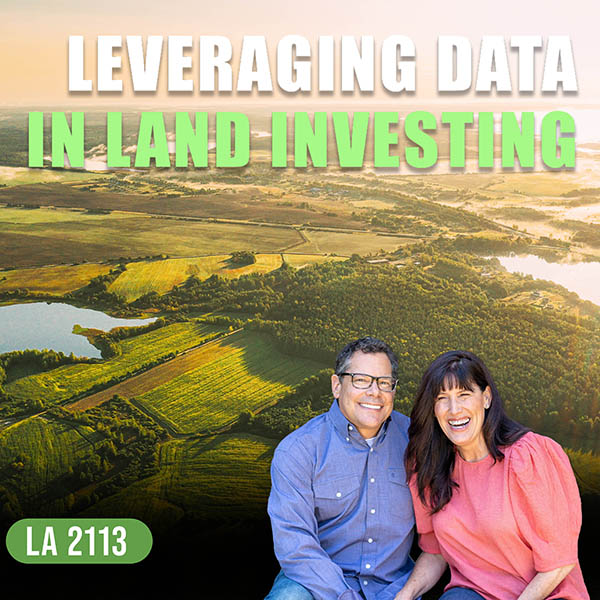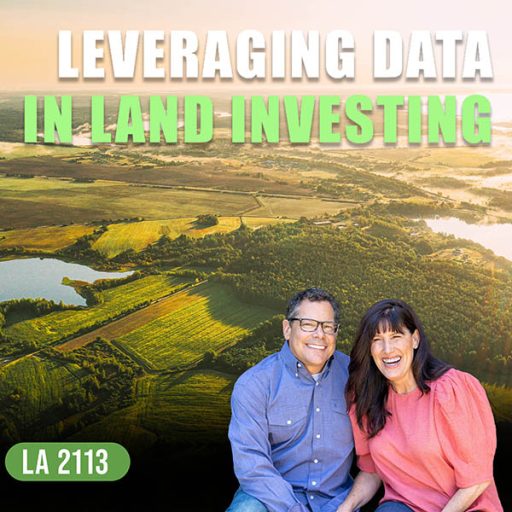I’m Steven Jack Butala.
I am Jill DeWit, and this is The Land Academy Show.
The Importance Of Data-Driven Decisions In Real Estate
This is episode number 2113. It’s Friday, and our topic is about the role of data in building a scalable land business. There is no possible way you can accurately run a real estate business in this day and age without every decision you’re making being data-driven. I don’t know how real estate agents do it. It’s all emotion and sales and talking all day long. It’s such an antiquated business model, and I don’t get it.
I spoke to someone the other day. They were asking all these philosophical big-picture questions about what we do. I couldn’t stop going to the data. It’s funny because that’s not how I started. I learned it from this one. It was all data, and I was trying to get into his head and into his world a little bit and try to go, “All right,” and talk about the bigger picture momentum and other factors and things that made sense to him.
I’m like, “The numbers will tell you where to mail. That’s it and you just do it. The numbers will tell you when you’re trolling and what triggers to look for. You just do it.” He was having trouble with that. At the end of the conversation, I found out it was because he’s a licensed real estate agent. Now that you bring this up, that is probably why some of this wasn’t making sense to him. It’s because that’s not where his head goes. It doesn’t automatically go to that.
I’ll get into the topics in great detail, but can you imagine, as a human on this planet, going to buy a car? Let’s say it’s a 2022 Toyota 4Runner, and you’re going to look at what’s for sale. Even if it’s used, maybe you’re doing it just online, and you realize that somebody is asking $42,000, and you say, “I’ll buy it,” without doing any data-type research.
What do they go for now? You should be having this conversation with yourself, “What’s a basic average price in my area for that car that I want? It’s $38,000. I can get a 2020 for $28,000. There’s some breakpoint in all that?” Now you’re making a data-driven decision because you’ve got a phone in your hand and a half hour to spare.
If you don’t make data-driven decisions like this automatically, or you’re standing in the grocery aisle and there are three brands of ramen noodles that you can buy, and this one’s cheaper, but this one’s better, you’re looking on your phone saying, “Everybody hates the cheap one. I’m going to spend a little bit more money and get the better one, and maybe next week I won’t.” Those are data-driven decisions in the simplest way. We all make them. If you are not making data-driven decisions, this is not the podcast for you and not the business for you.
I love your buying-a-car thing. I would like to take a moment on this. Jack buys a car before he’s even seen it. All the research is done. He knows all about the mileage, the issues, how long they last, how many miles we can get on them, and how fast they depreciate. He’s buying the car for the value today and ten years from now. Here’s how I think the planet buys a car.
Let me hear this. Is there any other way than that?
No, I know. Let me talk about the planet. “What a pretty red, but I don’t want the gray interior. Can I get the camel interior?” Do you care about the mileage? “Uh-uh. I want the camel interior with that red.”
Can I drive it away? Can I get it now?
Wait. Shoot. I’ve seen the black. There’s a new color called chalk.
Are you serious?
I don’t even know what chalk is. We have a friend who said, “I just bought this new Porsche and it’s chalk.” I’m like, “What the hell is chalk?”
That was silly. I don’t understand.
I still have to look it up. Anyway, Porsche chalk. That’s how I think people drive around or on social media, “Everybody says I should have this car, so now all I care about is I should have this car.”
Is there any truth to this?
I think there is. “I should have this car because everybody says I should. It’s environmentally friendly. I just need the color palette that fits with my life.”
Comparison Between Emotional And Data-Driven Decision-Making
I’m all for environmentally friendly, but those are emotional decisions. Those are non-data-driven decisions.
We make decisions on things like vehicles, is it going to work in 20 degrees? Is it going to work at freezing or below freezing? Where might I be? Not all cars do, by the way, hint.
That’s a good example that didn’t even register with me.
I like it when you brought that up. This is how I think other people walk around.
I’m glad we’re doing this, and we’ll get to the question here in a second. You need to ask yourself, whoever you are, if you make decisions that are data-driven or emotional. There is no place in any of this for emotion at all. There are a lot of places where you can go. Here’s a great example. Let’s do the question, and we’ll get into it. This is a great topic. Each day on the show, we answer a question from our Land Academy member Discord forum and take a deep dive into land-related topics by popular request.
Neil wrote, “Hi, everyone. Neil here from the Dallas suburbs. I joined Land Academy last week. I’m excited to learn and implement the strategies. I have owned some rental properties in the past, and my wife did her first BRRR last year by renovating blah, blah, blah. It did well, but I’m attracted to the Land Academy model because there’s no fix-up or maintenance and it’s scalable. Working through the content, the goal is to get my first mailer out on February 2.” This is a good little group. I hope you’re following up with our person yesterday. You guys are all like, “Hold each other’s feet to the fire.”
The BRRR Strategy Vs The Land Academy Approach
Here’s the definition of BRRRR and why it’s silly. Silly is the nicest way I can describe it. You purchase a property that’s distressed or poorly maintained. I’m all for acquisitions, by the way, and I’m all for buying real estate, but distressed and poorly maintained would never enter into a reason that I would buy a property. It would be price-relative to the rest of the properties around it. Decision number one in BRRRR is non-data-driven. I’m buying this because it’s distressed, not because it’s grossly undervalued.
The first R is rehab. Renovate the property. You’re spending money now, hoping that it will support some resale price, but we don’t know because maybe we didn’t even check about price when we bought it. By the way, this BRRRR model was created by Rocket Mortgage. They’re a mortgage company. They make money on mortgage origination fees, not even on the triage. Loan number one, buy the property. Loan number two, rehab the property.
The second R is rent. Rent the property out to generate income. It’s crazy and super easy in this market. You have a fully renovated property, and anybody who is an experienced landlord is going to tell you not to spend any substantial money on renovating a property. Your tenants are going to destroy it. Rent the property out to generate income. It’s super easy in this market. Number four is to refinance. This is loan number two on a property. You’re in a second-debt scenario. Refinance the property. I don’t know why you would refinance now. It’s a terrible market. Interest rates are high. Number five is repeat. Repeat the process.
Do you know what a refinance is?
More loans.
We know what the refinance is because now that it’s rented and fixed up, it’s worth more. You can pull cash out. That’s what people are doing.
Neil, congratulations. You have taken a very complicated and difficult real estate scenario twice and made it work for you. Welcome to Land Academy because it’s way easier here.
You’re going to sleep better too. We’re going to remove some loans from your life.
Our business model is as follows. Buy a piece of real estate and sell it for more. Two simple steps. If you can’t sell it for more, don’t buy it. I’m not picking on you. I don’t like cute little business gimmicks. Our topic is the role of data in building scalable land businesses.
That happened the other day too. I hate when people talk with all these acronyms. I had someone coming at me with all this, “What do you do with this, this, and this?” I’m like, “I think you mean this. I don’t know what all the terms are. I’m not doing this. Can we just talk like normal people?” I know that comes across when I’m talking to sellers and I’m talking to buyers.
I’m talking to them in normal language, not with a bunch of codes and things they don’t understand like, “Do you want a check or a bank wire?” Not things like “form of payment.” You could do it. There are little things you could use. People don’t want that. They may not understand it. Just knock it off. Anyway, I had to get that out. Thank you.
I had a little rant in here too. That’s good. We had two rants in one episode.
There we go. The role of data in building a scalable business is everything needs to make sense on paper. Jack is so good at this. Even just buying a car. I use the car analogy today. By the time he does his research and says, “I think we should buy X,” he thought about it at today’s value, five years from now value, and ten years from now value, or a hundred thousand miles. Do they hold their value?
That’s a good thing. You taught me that. I never used to look at this. Very early on, even before we were a couple and I was looking at a new car, you said, “Why don’t you go on eBay back then?” Now, it’s probably still eBay. This was before Autotrader and some of the other ones, but it was eBay and Craigslist back then. “Go see, find that car with 100,000 more miles on what you’re buying on it. See what it’s worth.” I’m like, “Ooh.”
That’s going to tell you, A) Does it survive that many miles? I’m like, “That’s smart.” B) What did it depreciate to? Is it down to a dollar? You might want to make a different decision. Is it hanging in there about $10,000, $20,000? You’re maybe spending $50,000, $60,000. I’m like, “You’re right. That was so good.”
I’ve learned that’s how he does personal things. Now, think about your company and think about your land company. Every company that we have, and we have several. We have Offers 2 Owners and we have ParcelFact, and there are other things behind the scenes that we run. Put on paper, what’s it going to cost to get started, what can you generate, and talk about your annual goals and all the things. What’s it going to take to hit those goals? Before you do one thing, even before your mailer goes out, you should be thinking about your year-end because the mail you’re sending today is priced and in an area that’s going to yield the profits that you want to hit your year-end goals. Should I repeat that?
Yeah.
The mailer that you’re sending today and what you’re looking at buying today are so far and well thought out that you’re going to hit the financial goals per deal that are going to lead you to your financial goals this quarter and your financial goals this year. I used $250,000 earlier this week. I want to do two deals a month. Back the $250,000. That’s a little over $60,000 a quarter. It’s a little over $20,000 a month. If I’m doing two deals a month, I need to make $10,000 per deal. Now I know what I’m mailing for.
It’s a huge turn-on for me.
Thank you. I have to send out offers, buy for $10,000, sell for $30,000. I’ve got some wiggle room in there. I know I screwed up. I’m still going to make $10,000. I’m going to hit my goals. I’m going to argue too because this is how we operate. Don’t go for two deals. Try to go for four deals a month so you know you’re going to hit your two deals. You know you’re going to have stuff in there, and you’re going to hit all your numbers. Your goal was $250,000 this year. If it all goes smashingly, you made $325,000. How good does that feel?
We have a lot of people in our group, tons of people that are either in or formerly in STEM-related professions. They’re what I call linear thinkers. If I do A, then B is going to happen, then B, then C, and then I have some options. Without knowing it, they realize what’s going to happen at the end of what they’re doing right now. Linear thinkers. They like to plan it out. That depends on how crazy you are. I’m nutcase crazy when it comes to this stuff. I want to know what’s going to happen in the end. I want there to be no risk on the way toward that.
Starting A Business With Purpose: Data-Driven Success Vs. Following Trends
If you’re not this type of person, you’re probably going to be in the workforce for the rest of your life. There’s a lot of pressure in this day and age, I see it all over the internet, to start your own company, brand yourself or brand some brand, and make a bunch of money and drive a Ferrari. It’s too bad because I don’t think most people are like that. If you’re waking up in the morning trying to figure out how to get out of the situation that you’re in or to hopefully even maybe take the situation you’re in, if it’s real positive, and make it better, you’re going to do great here.
I don’t care what your background is, STEM or not, you’re going to do great. But if you’re just doing it like a lot of 20 or 22-year-old people for whatever reason, I asked Jill one time about 10 times over the years that we’ve known each other, and she’s never changed her answer, but I still have to ask. Why do people get married? She says, without fail, “Because all their friends are doing it.” If all your friends are starting a land company or if you’re reading this and recording it and writing it down because you’re going to start your own Land Academy a couple of months from now, that’s not going to work. If it’s not coming from your soul, it’s just not who you are.
That’s good.
You have to want this bad, and you want to be independently wealthy and have some control over your life. This is a great way to do it. It’s not the only way. Whatever it is, it needs to be data-driven. Here’s the good news, there is so much freaking data out there now. When we started this, there was no data. There was no Google Earth. We bought properties. We made an educated guess about range and township in the legal description. We didn’t look at access. We just bought it. If it was $100 an acre, we would buy anything. We did very well doing that.
If we did that now, we would go out of business because there’s so much data available. We can make good acquisition decisions, and we can send this to a mailer to North Dakota bordering Canada. Any of those Northern states is tough. We know that because we see that no one is selling property there. We should do a talk about a day in the life of owning a land business in 2005.
That would be fun and funny.
How different it is. You know what’s not changed? It’s what Jill does. She gets on the phone. I make sure her phone rings. She gets on the phone with the seller. It’s the same scenario.
It’s true. Thank you.
Please allow data to be part of your life or reject it, one way or the other.
Let data in. Just embrace it. Breathe in the data.
We should start a company called Data Spa. Come on in. Here’s your lock. Here’s your robe.
What are you talking about today? My data flow. I was trying to go there. I was struggling to talk to that guy the other day. I’m like, “I got to pivot here.”
Why? What happened?
He was so touchy-feely, and I’m like, “This is the numbers. I don’t know what to say. Do what the math says.” He kept trying to pull me out of that. I’m like, “I can’t go out of it because that’s what makes sense.”
That’s 1925 sales tactics. Use language people don’t understand.
That was horrible.
I’m smarter than you are. You don’t know this acronym. If you don’t know what NOI is, I’m smarter.
That was not nice.
That’s dumb.
I think he made up a few. I think he made that one up.
That’s a personality disorder. If you have a personality disorder, please don’t join Land Academy. Was he a member?
No. It was good.
Join us next week for five more interesting episodes. You are not alone in your real estate ambition. We are Jack and Jill. Information and inspiration to buy undervalued property.















